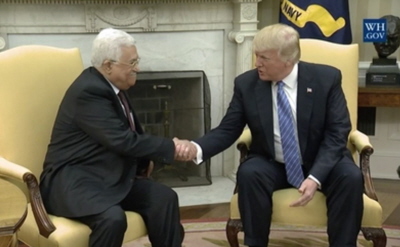 Niewygodna prawda o konflikcie izraelsko-palestyńskim
Niewygodna prawda o konflikcie izraelsko-palestyńskim
Fred Maroun
Tłumaczenie: Malgorzata Koraszewska
 W odpowiedzi na żądanie USA, by Autonomia Palestyńska (AP) przestała płacić rodzinom terrorystów, Issa Karaka, minister AP ds. więźniów, powiedział: “Społeczeństwo palestyńskie składa się wyłącznie z rodzin więźniów i szachidów [męczenników], i są oni wszyscy ofiarami z powodu okupacji izraelskiej. To żądanie wstrzymania wypłat dla rodzin więźniów nie jest małą sprawą, ale czymś bardzo wielkim z konsekwencjami społecznymi. Nikt w Autonomii Palestyńskiej nie uczyni takiego posunięcia. Autonomii Palestyńskiej będzie bardzo trudno zaprzestać pomocy humanitarnej dla rodzin więźniów i szahidów”.
W odpowiedzi na żądanie USA, by Autonomia Palestyńska (AP) przestała płacić rodzinom terrorystów, Issa Karaka, minister AP ds. więźniów, powiedział: “Społeczeństwo palestyńskie składa się wyłącznie z rodzin więźniów i szachidów [męczenników], i są oni wszyscy ofiarami z powodu okupacji izraelskiej. To żądanie wstrzymania wypłat dla rodzin więźniów nie jest małą sprawą, ale czymś bardzo wielkim z konsekwencjami społecznymi. Nikt w Autonomii Palestyńskiej nie uczyni takiego posunięcia. Autonomii Palestyńskiej będzie bardzo trudno zaprzestać pomocy humanitarnej dla rodzin więźniów i szahidów”.
Niezależnie od tego, czy minister rządu AP zdaje sobie z tego sprawę, czy nie, to jego oświadczenie mówi nam, że terroryzm palestyński jest gigantycznym przemysłem, bez którego społeczeństwo palestyńskie nie mogłoby funkcjonować.
Prezydent USA, Donald Trump, który w przeszłości powiedział: “porozumienie pokojowe nie zostanie osiągnięte, jak długo Palestyńczycy nie zrezygnują z terroru i nie uznają Izrael jako państwa żydowskiego”, mówi teraz, że “Abbas chce pokoju”, ale rzeczywistość nie daje dowodów na ten nowo odkryty optymizm.
Ci, którzy chcą pokoju, nie finansują zabijania na oślep ludzi, którzy chcą z nimi żyć w pokoju. Ci, którzy chcą pokoju, nie potępiają zabijania terrorystów w trakcie morderczego zamachu. Ci, którzy chcą pokoju, nie mają programów szkolnych, które „uczą dzieci, by zostawały spisanymi na stratę męczennikami, odrzucały negocjacje i przysięgały kontynuowanie stałej wojny ” (Marcus Sheff, dyrektor IMPACT-se).
Mówiąc wprost: Palestyńczycy otrzymują zapłatę za bycie terrorystami. Płaci się im, by zapewnić, że konflikt nigdy się nie skończy. Rodzą się w klimacie nienawiści, wychowywani są na morderczych płacach za terroryzm i płaci się im, by kontynuowali ten cykl przez popełnianie kolejnych aktów terroru. Każde dziecko urodzone w społeczeństwie palestyńskim ma większe szanse że zostania terrorystą niż, że będzie mieć normalne życiem. Palestyńczycy nie wynaleźli arabskiej nienawiści do Żydów. Mnóstwo jest tego na całym Bliskim Wschodzie. W Libanie zwykła rozmowa z Izraelczykiem może zaprowadzić cię do więzienia. Pacjenci syryjscy, leczeni w izraelskim szpitalu polowym zbudowanym specjalnie dla tego celu, nie mogą mieć niczego z hebrajskimi napisami, kiedy wracają do Syrii, bo mogą za to zostać zabici. W rzeczywistości, to arabska nienawiść do Żydów stworzyła konflikt izraelsko-palestyński, bo ze względu na tę nienawiść Arabowie odrzucili niepodległość izraelską i rozpoczęli wojnę.
Przemoc palestyńska wobec Żydów zawsze była spleciona z nienawiścią arabską do Żydów i dzisiaj jest głównym narzędziem utrzymywania jej przy życiu.
Jak długo Palestyńczycy mają za przywódców terrorystów, jak długo są wychowywani w nienawiści i opłacani, by byli terrorystami, prawdopodobieństwo, że pokój wyniknie z negocjacji z Palestyńczykami, wynosi dokładnie zero. Taka jest niewygodna prawda o konflikcie izraelsko-palestyńskim.
Żaden przywódca USA nigdy nie mówił, że Osama Bin Laden, były szef Al-Kaidy, organizacji, która zaplanowała zamachy 9/11, chciał pokoju ze Stanami Zjednoczonymi Ameryki. Żaden przywódca europejski nigdy nie powiedział, że Abū Bakr al-Baghdadi, przywódca ISIS, organizacji, która wzięła na siebie odpowiedzialność za kilkanaście ataków terrorystycznych w Europie, chce pokoju z Europą. Nie mówią tego, bo byłoby to absurdalne. Mówienie, że ci, którzy podtrzymują terror palestyński wymierzony w Izrael, chcą pokoju z Izraelem, jest równie absurdalne, niemniej to właśnie mówią.
Były prezydent USA, Barack Obama, powiedział to osiem razy. Przywódcy europejscy mówią to często. A teraz powiedział to również Trump.
Politykom trudno jest zaakceptować tę prawdę, ponieważ znaczy ona, że rozwiązanie dla Palestyńczyków trzeba znaleźć wbrew Palestyńczykom, co jest politycznie niepoprawne, nawet dla Trumpa. Niemniej powinno to zostać powiedziane.
Do szukania pokojowego rozwiązania nie ma sensu angażować Fatahu, Hamasu lub kogokolwiek, kto dziś reprezentuje Palestyńczyków. Wszyscy oni zawiedli swój naród i robią to każdego dnia. Jedyną nadzieją na pokój obecnie jest rozwiązanie narzucone przez większe siły, takie jak Egipt i Arabia Saudyjska. Tam należy skierować wysiłki.
Spotkanie z Abbasem jest stratą czasu i zaledwie odwracaniem uwagi, Politycy zachodni powinni znaleźć odwagę powiedzenia tego, a potem przejść do rzeczywistych rozwiązań.
 Fred Maroun
Fred Maroun
Pochodzący z Libanu Kanadyjczyk. Wyemigrował do Kanady w 1984 roku, po 10 latach wojny domowej. Jest działaczem na rzecz liberalizacji społeczeństw Bliskiego Wschodu. Prowadzi stronę internetową fredmaroun.blogspot.com
twoje uwagi, linki, wlasne artykuly, lub wiadomosci przeslij do: webmaster@reunion68.com


